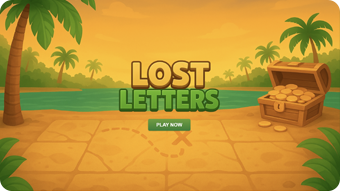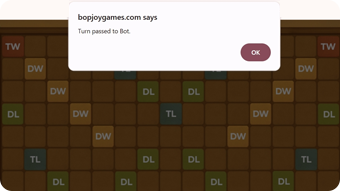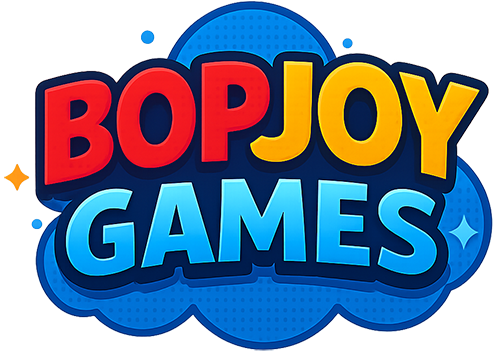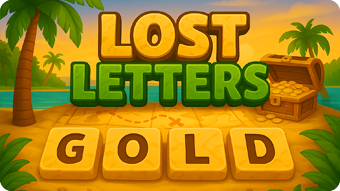LOST LETTERS
Welcome to Lost Letters, where classic word-building gameplay drifts ashore on the warm, golden sands of a sunlit desert island. Here, the familiar mechanics of placing letters and forming words take on new life against a backdrop of swaying palms, shimmering tides, and the quiet promise of hidden treasure. It’s a game that invites you to slow down, settle in, and let your vocabulary lead the way — not with urgency, but with curiosity and calm.
This is more than just another word game. Lost Letters takes the time-tested joy of board game strategy and infuses it with a sense of place and purpose. Your tiles are no longer just letters — they’re tools, like compass points or pieces of a weathered treasure map. Every word you build helps chart a new path across the grid, revealing new opportunities and leading you closer to the chest of gold that sits just off to the side, waiting to be earned through wit and strategy.
Your island adventure starts here — where language meets logic, the scenery clears your mind, and the next great word is never far from the tide.






📜 A Brief History of the Game That Inspired It All
The roots of Lost Letters trace back to one of the most iconic word games of all time — Scrabble™. The idea behind that original classic began during the Great Depression, when American architect Alfred Mosher Butts set out to create a game that combined chance, skill, and vocabulary. He analyzed letter frequency in the English language by studying newspapers and magazines, assigning each letter a point value based on how often it appeared in print — a detail that still defines modern tile-based word games today.
Butts’ original version, called Lexiko, eventually evolved into a game he named Criss-Crosswords in the late 1930s. It was a simple yet brilliant concept: form words using randomly drawn letters on a grid, earning points for both word length and letter rarity. It wasn’t until the 1940s, when game-loving entrepreneur James Brunot took over production, refined the rules, and renamed it Scrabble, that the game began to gain traction.
By the early 1950s, Scrabble had quietly turned into a cultural phenomenon. It became a staple in American households, and by the 1980s, it had made its way onto computer screens. Its success wasn’t just due to nostalgia — it came from the clarity of its rules and the intellectual satisfaction it offered.
Games like Lost Letters are built on this legacy — the idea that words are more than just language; they’re strategy, structure, and a kind of mental navigation. While our version swaps the living room for a tropical island, the spirit remains the same: take the letters you’ve got, find your openings, and make the smartest move possible.
🎯 Gameplay That Balances Strategy and Simplicity
At its core, Lost Letters sticks to the format that works: build high-scoring words by placing letter tiles on the board to take advantage of multipliers and strategic intersections. You begin with a random set of seven letters drawn from the bag, and from there, your decisions define the game.
Do you build a short word to open space for later? Stretch a high-value letter onto a triple word tile? Or hold back and wait for a better draw? Every move is a puzzle in itself — equal parts logic, planning, and linguistic intuition.
But this isn’t about speed. Lost Letters plays at your pace. Whether you're playing solo against the bot or competing with a friend, the tempo remains relaxed. Take your time. Plan your move. Watch the board evolve.
🗺️ Why a Desert Island?
We wanted Lost Letters to feel like an escape — not just from your day, but from busy screens and overdone design. That’s why we chose a setting that evokes both adventure and calm.
A deserted island represents possibility. It’s a space where time slows down, where every move feels intentional, and where discovery is earned, not given. Just like in a word game, nothing is handed to you. You build your path one choice at a time.
The treasure chest beside the board isn’t just for show — it’s a visual metaphor. Each word you play brings you closer to mastery, to clarity, and yes, to victory. It’s the kind of reward that’s satisfying not because it’s flashy, but because you earned it.
🧭 For Every Kind of Player
Whether you’re new to word games or a lifelong letter tactician, Lost Letters welcomes you in. The layout is intuitive. The tone is relaxed. There’s no pressure to rush or overthink — just thoughtful, engaging gameplay that adapts to your pace.
Play a quick round before lunch. Stretch a single game over an afternoon. Or keep the tab open and return whenever you're ready for another move. Lost Letters is made for flexible play — steady, satisfying, and always ready for one more word.

